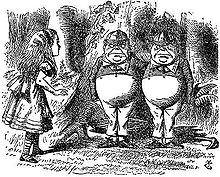Part 1: https://howardmerrell.blogspot.com/2019/12/can-we-just-all-get-along-part-1.html
Part 2: https://howardmerrell.blogspot.com/2019/12/can-we-just-get-along-part-2.html
*********************************************************
All of them,They always,
I don't need to talk to her; I already know what she thinks.
 I think you can tell where I'm headed with that. Hold the thought for a minute, while I tell you about a road sign. Between here and Yigo (pronounced Jee-go, for you non-Guamanians) on what we call the "Back Road," there is a simple warning sign that says, "Slow Down." I use the sign as an illustration to talk about the difference between rhetoric and logic. Granted, rhetoric should be built on sound thinking, but there are trades to be made. When we are trying to speak in such a way as to persuade people, clear distinctions, and careful definitions may be left by the side of the rhetorical highway. Take the sign for instance. Clearly, the sign is wrong. Just as clearly, however, it communicates an important message.
I think you can tell where I'm headed with that. Hold the thought for a minute, while I tell you about a road sign. Between here and Yigo (pronounced Jee-go, for you non-Guamanians) on what we call the "Back Road," there is a simple warning sign that says, "Slow Down." I use the sign as an illustration to talk about the difference between rhetoric and logic. Granted, rhetoric should be built on sound thinking, but there are trades to be made. When we are trying to speak in such a way as to persuade people, clear distinctions, and careful definitions may be left by the side of the rhetorical highway. Take the sign for instance. Clearly, the sign is wrong. Just as clearly, however, it communicates an important message.Let's say my old truck is having a bad day and I'm chugging down the Back Road at all of ten miles an hour. Traffic is lined up behind me. I see the sign. Does it mean I'm supposed to slow down to five miles per hour? No. But, if we change the sign to read, "If you are driving too fast, slow down." aside from overfilling the space on the sign, the longer message loses the punch of the shorter version. The longer one is more accurate, but the shorter one probably communicates the intended message more effectively.
We crave simple, easily mastered one size fits all explanations. The problem is they don't fit all.
There is almost surely one of them who isn't like all of them.
They, at least some of them, don't always. . . .
And people are too complex for us to assume that we have their number, just because we know the cultural neighborhood they live in.
A few years ago I heard a lecture by an African man who spent the bulk of his childhood and teen years at a Muslim boarding school where he learned a conservative brand of Islam. Through a series of amazing, even miraculous events, he converted to Christianity. When I heard him, he was leading a ministry that helped Christians reach out to Muslims. One thing he said really stuck with me. "Islam is a system. A Muslim is a person."
As I've said in the last two posts, the fact that Christians are divided in an ugly way, over the impeachment and trial of President Trump, is sad. In the number two post on this topic, I point out that one way we do that is to see people with whom we disagree as "Others." "They aren't like me." Do you remember the joke, "I love mankind; it's people I can't stand"? The opposite is true, in the non-humor world. I can easily dislike an amorphous group--"them," or, "those people," or (fill in the blank). Often, though, if I get to know one member of that group, I find that I'm surprised. "He isn't what I expected.
Uncle Mc was blind as a result of his time as a POW in WW2. Uncle Mc grew up in the segregated South. In one of his many hospitalizations the nurse who cared for him most, and best, was a Black woman. Some who knew Uncle Mc were surprised that he praised this woman for her kindness, dedication, and skill. "Don't you know . . .?" Uncle Mc replied something like this, "If you have to tell me that she is Black, then it really doesn't make any difference does it?"
If you are only going ten miles an hour when you pass that sign on the Back Road, please don't slow down. Likewise, if you think you know your neighbor, or even more so fellow Christian, because you have heard what her group is like, don't stop there. Share a pizza, work on a project together, just do some life together. Likely, both of you will find out there is more to the other than you, or she, realized.
It's a place to start.














